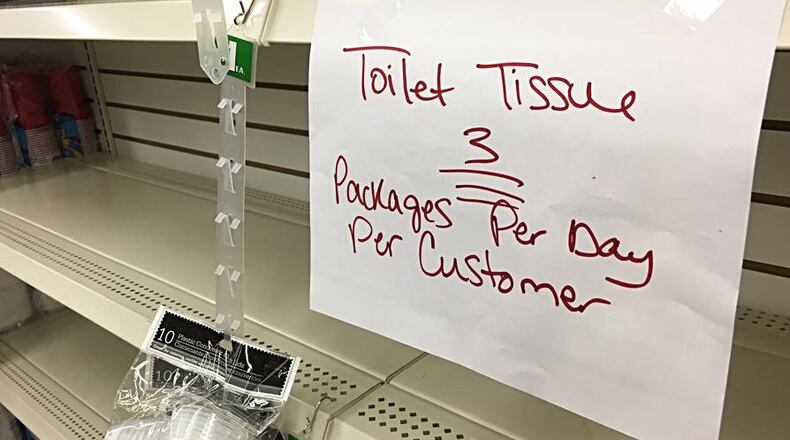That might be asking them to go against human nature, though.
“Even normal people can react in unusual or abnormal ways,” said Luke Tse, a psychology professor at Cedarville University. “One of those is hoarding, which, from a psychological standpoint, is not a healthy exercise. But when we consider the mindset of people, they don’t usually think of themselves as hoarding, they’re thinking of themselves as being protective, or perhaps even overprotecting themselves in the event that things could even get worse.”
RELATED: Coronavirus: Long days take toll on grocery store employees
With a global pandemic declared and many citizens in Ohio first asked and then ordered to stay home, panic food buying has become a hot topic.
Stores can’t seem to keep certain items in stock, particularly toilet paper and hand sanitizers, and have gone from restocking their shelves perhaps twice a day to multiple times a day depending on when new supplies come in, area grocers said.
Their employees have had to work long hours, and they’ve adjusted their schedules to give the staff some relief. Most are looking to hire new employees to help with the demand.
Stores have also adjusted their hours to allow time for sanitizing and restocking, and some have designated certain hours for senior citizens to shop. They’ve also limited the number of items each person buys per visit to ensure there’s enough for other consumers.
RELATED: Special hours set aside for some shoppers
Kroger CEO Rodney McMullen was among several grocery executives March 15 to ask President Donald Trump to inform the country plenty of food is in the supply chain, and Erin Rolfes, spokesperson for Kroger’s Dayton-Cincinnati division, echoed McMullen’s sentiments.
“We’re not in the business of storing products, we’re in the business of selling it, so as trucks are coming in from our suppliers, they’re going right back out to the stores,” Rolfes said. “Our supplier pipeline is really strong … we’re not seeing issues with getting supplies, (even though) folks are buying a lot more than they usually would.”
Kroger is among area stores that have put limits on such items as toilet paper, cleaning products, milk, eggs and bread – not because there’s a shortage on those items but rather to ensure enough is available for all consumers throughout the day.
“If you think about it, a lot of our customers who might be using SNAP (Supplemental Nutrition Assistance Program) benefits or who are low income, they’re not able to stock up in the same way that some of us might be able to, so we want to make sure that everybody has the opportunity to get that fresh, good food,” Rolfes said.
RELATED: Coronavirus: Ohio Supreme Court sets aside $4M for local courts to buy remote operations equipment
Although his nearly-100-year-old business has experienced a huge increase in customers, Shoemaker said he has generally been able to keep things in stock.
While pictures of empty shelves – and reports of unruly customers – have populated social media from all parts of the country since states began restricting citizens’ movement and shutting down businesses in the past two weeks, Shoemaker said he has not experienced much of either.
“We’ve had no issues at all,” he said. “I mean our business has been more than it’s ever been before, but we’re not having any issues here. I mean everybody seems to be in pretty good spirits and have not treated us bad at all.”
He has increased his warehouse orders by four or five times, though.
“Probably they’ll be out of a few things down there at the warehouse because of the business that everybody’s doing, but they expect us to get probably 75 percent of what we ordered, which would be great if that’s what we get,” he said of a shipment coming Tuesday.
“Toilet paper of course has been the big one in the last week or so. Canned vegetables and fruits, we’ve been hit hard on those. We’ve still got some. We haven’t we haven’t run out of those. Milk is another one that’s been hit hard. Eggs, bread — just the normal things that people normally load up for a snowstorm or something that’s kind of what we’re seeing. But people are panic shopping so they’re buying twice as much as they normally would buy.”
Still, during this time of crisis, he urged people to ensure they and their families remain healthy and be sensible, and take a balanced approach.

